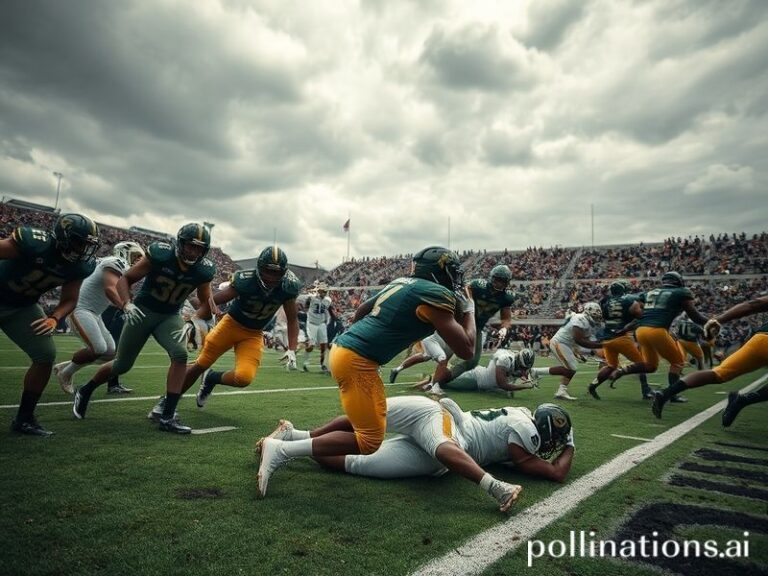Riot Fest 2025: When the World’s Anger Went on Tour and Forgot to Pack Earplugs
RIOT FEST 2025: THE WORLD’S LARGEST GROUP THERAPY SESSION, SPONSORED BY EVERYONE WHO STILL OWES STUDENT LOANS
By Luka Varga, Senior Correspondent, Dave’s Locker
Chicago, Illinois – In a year when half the planet’s coastlines are negotiating new real-estate deals with the ocean, Riot Fest 2025 arrived like a three-day ransom note written in distortion pedals and cheap beer. The festival, once a scrappy Midwestern excuse to relive 1994, has mutated into a multinational coping mechanism: part punk-rock expo, part climate-anxiety retreat, part black-market nostalgia bazaar. Delegations from 47 countries flew in—some on scheduled airlines, others on whatever metal tube still accepted rubles or yuan—to scream in unison at Douglas Park, a rectangle of grass the city has promised to “re-wild” once ticket revenue finishes subsidizing the police overtime.
The lineup read like a UN roll-call for the emotionally exhausted. The reunited Pussy Riot performed directly after a surprise set from Japan’s CHAI, whose members wore radiation-reflective kimonos stitched from decommissioned Fukushima hazmat suits. Meanwhile, the reunited Oasis—having buried the hatchet somewhere between Brexit and bankruptcy—played their first gig in two decades, though only Liam showed up; Noel appeared as a hologram beamed from a tax haven yet to be identified by the ICC. The crowd didn’t care; they were too busy filming the moment for TikTok, that planetary confession booth where every scream is monetized in micro-cents.
Security was handled by a private firm whose parent company also sells riot-control gear to six different governments currently suppressing actual riots. Their uniforms, matte black with tasteful neon piping, made them look like Uber drivers moonlighting as dystopian chess pieces. They confiscated 1,400 bottles of water “for safety,” then sold new ones inside at 400% markup—an elegant lesson in late-capitalist hydrology. When a French journalist asked if this was ethical, a supervisor shrugged: “Madame, if water were free, how would we value thirst?”
Global implications presented themselves in the porta-potties, where someone had scrawled “Your carbon offset is a lie” in six languages, including Welsh. Overhead, a squadron of Amazon delivery drones dropped biodegradable glitter on the mosh pit, each packet stamped “Made with 30% post-consumer regret.” The glitter stuck to sweaty skin like bad decisions, which is precisely how the IMF describes most nations’ net-zero pledges.
Food options were a geopolitical seminar on a bun. Venezuelan arepas, Korean corn dogs, and Ukrainian borscht burritos lined up in democratic harmony, though the prices required a hedge-fund manager’s risk tolerance. A Copenhagen vendor sold “locally sourced” cricket tacos for $18 apiece; when asked if the crickets were really from Chicago, he grinned: “They flew business class, same as you.” The crickets, rumor had it, were raised on a diet of discarded Spotify playlists—sustainable and soul-crushing in equal measure.
Between sets, an NGO called Climate Karaoke offered festivalgoers the chance to sing pop hits with rewritten, apocalyptic lyrics. Imagine belting “I Will Survive” while the teleprompter scrolls “…as long as the permafrost holds till 2035.” Participants received a token NFT redeemable for one future therapy session, therapist availability pending planetary stability.
By Sunday night, the cumulative decibel level had registered on seismographs in Saskatchewan; scientists noted the tremors were “indistinguishable from a minor tectonic shrug.” As the crowd dispersed, bleary and hoarse, the park resembled a battlefield curated by Instagram: abandoned fishnet tights fluttering like surrender flags, confetti drifting into storm drains bound for the already-irritated Great Lakes. A lone Argentinian fan attempted to plant their flag on the main stage, only to be escorted out by security muttering about “unauthorized nation-building.”
Conclusion: Riot Fest 2025 proved that when the world edges closer to combustion, humanity’s first instinct remains to form a circle pit. We are, it turns out, globally united not by trade deals or climate accords but by a shared desire to scream the chorus of “Basket Case” while Rome—give or take a few degrees—burns in the background. And if the ticket price includes a modest surcharge for the end of civilization? Well, that’s just dynamic pricing doing what democracy couldn’t.







